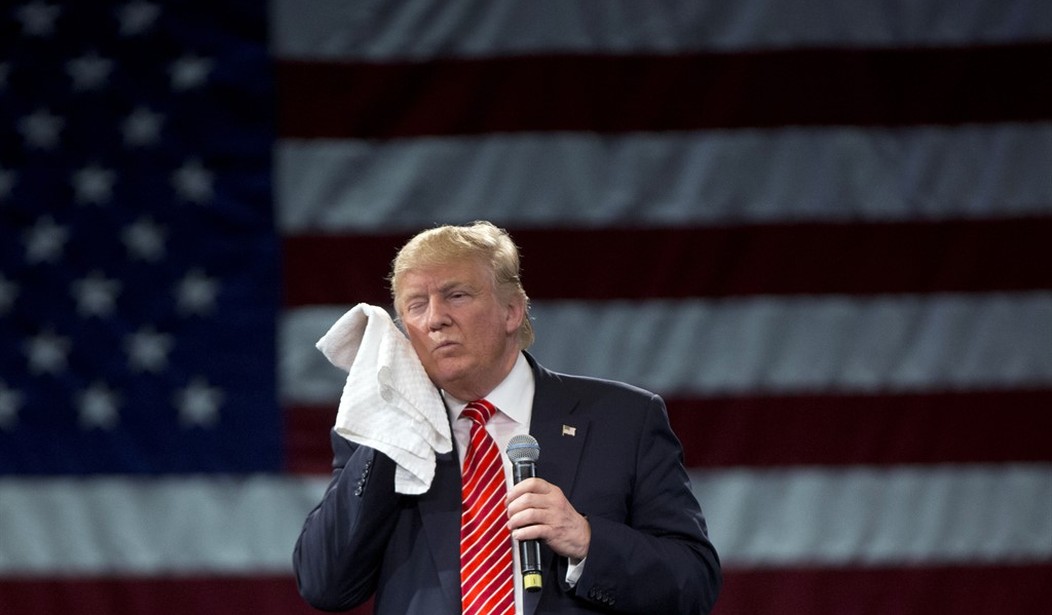WASHINGTON -- Donald Trump has made global trade a major issue in his presidential campaign, accusing U.S. companies of hurting our economy by moving jobs abroad to benefit from cheap labor.
But it turns out that Trump, who has called some of his opponents hypocrites, is an even bigger hypocrite on this issue.
After he negotiated a lucrative merchandise-licensing deal with clothing manufacturer Phillips-Van Heusen to make a line of Trump clothing and accessories, it was learned that his products were made in low-wage countries such as China, Bangladesh and Honduras.
People with an intimate knowledge of the deal said that while Trump was deeply involved in negotiating the terms, he expressed no interest in where the Trump Collection of shirts, suits and other apparel were to be manufactured, according to a report Monday in The Washington Post.
"Finding the biggest company with the best practices is what was important to him," said Jeff Danzer, who was vice president of the company that Trump hired to broker the deal. "Finding a company that made in America was never something that was specified."
Another person who participated in the negotiations, who did not wish to be identified, said Trump was very much involved in the overseas manufacturing discussions and confirmed what Danzer said. "I can tell you that in none of the meetings did it come up," he said.
Sending jobs overseas apparently runs in the Trump family and has significantly added to their wealth. The real estate billionaire's daughter, Ivanka, a vice president of the Trump firm, sells her own line of jewelry and women's clothing, much of it manufactured in China.
Recommended
Meantime, while he's been making himself richer with Third World labor, he's has been mercilessly flogging any and every U.S. company that is doing the same thing. He has attacked the Ford Motor Co. for opening up factories in Mexico and Nabisco for moving some of its cookie production there as well.
After the Carrier air conditioner manufacturer announced it was moving its plant from Indiana to Monterrey, Mexico, Trump said, "We cannot allow this to keep happening. It will not happen under my watch."
While he has no problem making Trump shirts and suits in China, he is exploiting the issue that he knows will make him popular among organized labor and its workers. And he seems to be getting away with it.
Last year he told CNN that China's workers were "paid a lot less and the standards are worse when it comes to the environment and health care and worker safety."
His rivals for the Republican presidential nomination have attacked him for his double standard, but they have failed to make a dent in Trump's working-class support.
In a GOP presidential debate earlier this month, Florida Sen. Marco Rubio challenged Trump to say that "all the Donald Trump clothing will no longer be made in China and in Mexico, but will be made here in the United States."
Trump weakly claimed that his apparel brands couldn't be made here at home, blaming China's manipulation of its currency. But the truth is that he couldn't make and sell them as inexpensively as he can under China's low-wage scales.
While he has threatened to impose very high tariffs on imported goods, he doesn't say how much that would add to the prices paid by American consumers.
Robert Lawrence, a professor of trade and investment policies at the John F. Kennedy School of Government at Harvard, has studied the impact Trump's tariffs would have on the cost of imports, and it's not a pretty picture. He estimates that a $250 Trump suit made in China would see its price jump to $350 under his import tax proposals. "The impact would be staggering and widespread," he told the Post.
America's trade policies have been demagogued for decades by labor union bosses, arguing that America's economy would be destroyed by free trade agreements.
But presidents in both parties have championed free trade agreements and presided over their expansion, including Ronald Reagan and Bill Clinton, who expanded Reagan's North American Free Trade Agreement to include Mexico. Notably, both left office with their popularity intact as successful stewards of a growing, job-producing economy.
But that hasn't been the case under President Obama, whose chief legacy has been a long and painfully sluggish recovery, anemic job creation, a shrinking labor force, and an underperforming economy that continues to this very day.
That America continues to sell its goods and services throughout the world and buys a lot of exports is not the cause of our mediocre economy, which is growing at little more than 1 percent.
Our economic troubles stem from excessive tax rates on businesses, investors and families that have stunted economic growth; and a mountain of crushing government debt, costly federal regulations, and a massive, antiquated bureaucracy in need of a top-to-bottom housecleaning.
No one has argued more convincingly against tariffs and other tax penalties on trade than the late free-market economist Milton Friedman in his best-selling book "Free to Choose."
"The gains to some producers from tariffs and other restrictions are more than offset by the loss to other producers and especially to consumers in general," he writes in the chapter titled "The Tyranny of Controls."
"Ever since Adam Smith there has been virtual unanimity among economists ... that international free trade is in the best interests of the trading countries and of the world," Friedman reminds us.
That Trump makes his suits and shirts in countries that charged him the cheapest price that benefits American consumers and businesses only proves Friedman's point.

























Join the conversation as a VIP Member